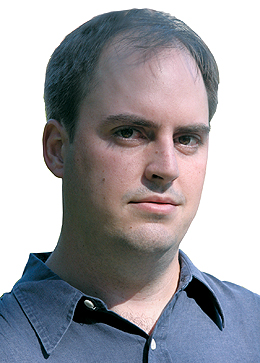AROUND THE QUADS
5 Minutes with… Nicholas Dames
Nicholas Dames, a specialist in 19th-century British fiction, is Theodore Kahan Professor in the Humanities. He received his B.A. from Washington University and his Ph.D. from Harvard. Dames’ latest book, The Physiology of the Novel, will be published by Oxford this year. In 2005, he received Columbia’s Presidential Teaching Award. CCT caught up with him recently to find out more.
Q: Where did you grow up?
A: I was born in Chicago proper, but I mostly grew up in a town called Wilmette. It’s a suburb along Lake Michigan.
Q: What did you want to be when you were growing up?
A: I spent weeks in a state of fantasy, pretending to be a private detective. Not terribly practical, but that was probably my first job ambition.
Q: How did you get interested in your subject?
A: I wasn’t interested in Victorian literature until graduate school. I majored in English and went to school thinking I was going to do modernist literature. I was a terrible snob in high school and college about Victorian novels. And then I had a conversion experience in graduate school.
I came to this realization where modernism began to feel more and more like a junior high-school clique. It felt like a bunch of self-involved, narcissistic inside jokes — a lot of who’s in, who’s out, who’s the avant-garde and who’s not. And suddenly Victorian literature began to seem really acute about the things that I was finding myself fascinated with — particularly class and the relationship of the self with social structures like class. It began to remind me of the world I lived in much more acutely than anything I was reading in modernist literature.
Q: How did you come to Columbia?
A: This is the only job I’ve ever had, actually (laughs). I was terribly lucky.
Q: How do you like the city?
A: I always wanted to wind up in a large city, so this was just fantastic for me. I like the urban environment, I find I kind of need it. The density. The way in which you never feel lonely but are also allowed to be alone. That combination just works well with me.
Q: Which classes are you teaching right now?
A: Lit Hum, and a Theory of Fiction Seminar, “The Victorian Novel in Theory.”
Q: What’s your favorite kind of class?
A: My favorite courses that I teach are the ones that attract people from a lot of different majors. There’s a course I teach called “The 19th Century European Novel.” That, for whatever reason, attracts a lot of the science majors, math majors … so there’s this great kind of energy in the room. People from outside the English major can be very inventive about ways of approaching a novel analytically, and less reluctant to learn new ways of doing it.
Q: What are you working on right now?
A: I’m working on a book that’s a history of the chapter as a form, all the way from the Bible and early manuscripts to the modern-day novel. It’s kind of a huge — unwieldy — project.
Q: What’s something your students would never guess about you?
A: That I often consider myself incredibly lazy.
Q: Who would play you, in the movie of your life?
A: (Laughs) I would really hope it would be Jeremy Irons, for the voice. I would love to hear my words coming out of his mouth.
Q: If you could go anywhere in the world right now, where would it be?
A: Coastal Maine. I love to go there in the off-season. It’s incredibly foggy, you have miles and miles of beach to yourself.
Q: What’s your favorite food?
A: Noodles. Every culture has a noodle, and they’re all good.
Q: Coffee or tea?
A: Why choose? Coffee in the morning, tea the rest of the day, constantly.
Interview: Rose Kernochan ’82 Barnard
|









